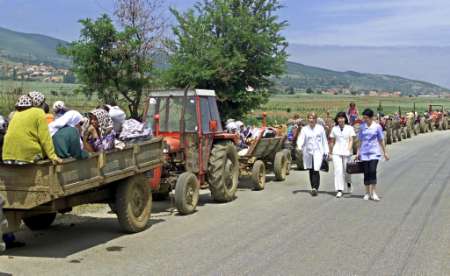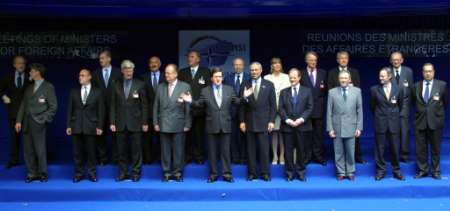Enter content here A Macedonian policeman watches as ethnic Albanians are stopped at a police checkpoint after they fled the ethnically mixed village of Matejce May 29, 2001 following clashes between Macedonian forces and ethnic Albanian guerrillas. This first group of some 100 of the 800 people fleeing the village, including Serbians, were stopped by Macedonian police at a checkpoint in the nearby Nikustak village and the men were taken to Kumanovo police station to be examined for possible use of fire arms. REUTERS/Radu Sigheti REUTERS  Macedonian nurses walk along lines of ethnic Albanian refugees halted at a police checkpoint after they left the ethnically mixed village of Matejce, May 29, 2001 following clashes between Macedonian forces and ethnic Albanian guerrillas. The nurses provided first aid for this first group of some 100 of the 800 people fleeing the village, including Serbians, as Macedonian police at the checkpoint in the nearby Nikustak village took the men to Kumanovo police station to be examined for possible use of fire arms. REUTERS/Radu Sigheti The foreign minister of Russia Igor Ivanov speaks at a press conference at a meeting of NATO foreign ministers in Budapest on May 29, 2001. Alliance foreign ministers meet in Budapest for two days, their first formal assembly behind the old Iron Curtain, with the ethnic Albanian insurgency in the southern Balkans high on the agenda. Ivanov repeated Russia's defence of the ABM treaty but welcomed US consultations on missile defence. REUTERS/Joe Klamar  Foreign Ministers pose for photographers (left-right) French Hubert Verdin, Danish Mogens Lykketoft, Czech Jan Kavan, Greek George Papandreu, Canadian John Manley, Hungarian Janos Martonyi, Belgian Ambassador Thierry de Gruben, Icelandic Halldor Asgrimsson, NATO Secretary-General George Robertson, Italian Lambero Dini, U.S. Colin Powell, Luxemburg Lydie Polfedr, UK Robin Cook, Netherland Josias van Aarsten, Turkey Ismail Cem, Norway Thorbjorn Jagland, Spanish Josep Pique i Camps, Polish Wladyslav Bartoszwski and Portuguese Jaime Jose Matos da Gamma at a meeting of NATO foreign ministers in Budapest on May 29, 2001. Alliance foreign ministers meet in Budapest for two days, their first formal assembly behind the old Iron Curtain, with the ethnic Albanian insurgency in the southern Balkans high on the agenda. REUTERS/Joe Klamar TRAJKOVSKI: THE PARTICIPANTS IN THE TALKS ARE READY TO WORK FOR THE CITIZENS' INTERESTS. MIA "I am pleased by today's talks, where all participants expressed readiness to work for the interests of the Macedonian citizens," President Boris Trajkovski said after today's meeting with the leaders of VMRO-DPMNE - Ljubco Georgievski, SDSM - Branko Crvenkovski and DPA - Arben Xhaferi, PDP representative Azis Polozani and EU High Representative of Joint Foreign and Security Policy Javier Solana.
The Macedonian President said that a document with conclusions has been coordinated, which was accepted by all participants.
He said that a joint statement in which the leaders of the political parties support the results from today's meeting would be presented at tomorrow's ministerial meeting of NATO, EU and Euro Atlantic Partnership Council in Budapest.
"During this week, I will schedule the meeting with the political parties' leaders, by which the political dialogue will continue," Trajkovski said.
At the end, President Trajkovski expressed gratitude to all participants at today's meeting, and hailed their constructive attitude in the talks.
Leaders of VMRO-DPPMNE, SDSM, DPA and PDP, at a meeting with the President of the Republic of Macedonia, have discussed the current security and political situation in Macedonia.
They all have agreed that the future of the Republic of Macedonia can only be decided by democratically elected representatives, working through a peaceful political process. They have underlined their commitment to pursue and intensify effort to restore peace and security and to achieve early progress in the political dialogue within the institutions.
President Trajkovski will call a meeting of party leaders this week.
They insist that the violent actions in pursuit of political aims are totally unacceptable and illegitimate means that all democratic parties in the Republic of Macedonia reject.
Taking into account the negative conclusions of the international community on the Prizren Document of 22 May 2001, the status of the document in question is no longer relevant. The intensified political dialogue can and will proceed and produce significant results to the benefit of all the communities in the country. All of the representatives support the political dialogue within the Parliament and the enhanced meetings of party leaders as the only form of solving open issues.
They reaffirm support for the coalition government of state unity to overcome the crisis, normalize the situation and realize the reform process for Euro-Atlantic integration as soon as possible.
They commit themselves to accelerate legislative work on measures agreed before recent developments, and to achieve substantial progress on President Trajkovski's agenda for addressing inter-ethnic issues, endorsed by all coalition partners, by June 15. NATO supply base hit in attack on Macedonian town. ABC News A military supply base used by the NATO-led KFOR peacekeeping force was hit by a mortar blast when suspected guerrillas launched an attack on the northern Macedonian town of Kumanovo.
Belgian liaison officer Major Eddy Custine told AFP the blast caused no casualties at the Karpos base, which is shared by a Belgian supply unit with KFOR and the Macedonian army.
A Macedonian army spokesman, Blagoja Markovski, said "terrorists" were to blame for the attack on Kumanovo. STRONG SUPPORT TO MACEDONIA'S SECURITY AND STABILITY. MIA Macedonian Foreign Minister Ilinka Mitreva attended Tuesday a meeting of Foreign Ministers of the South East European countries, focused on coordination of wording of the document on common evaluation of the regional security and possibilities in the SEE, MIA's special correspondent reported.
At the meeting, also attended by US Secretary of State Colin Powell, the SEE Foreign Minister adopted a joint Declaration, saying that the SEE countries are committed to build peace, security and stability in the region. They will urge resolution of problems by political dialogue and developing of regional cooperation.
Today, Mitreva also met with her Romanian, French and Danish counterparts, Mircea Geoana, Hubert Vedrine and Mogens Liketoft, who extended their strong support to Macedonia's territorial integrity and sovereignty, condemning the acts of violence by the Albanian terrorists, which according to today's Communiqué of the North Atlantic Council, present a threat not only to the security in Macedonia, but also to the security of the entire region. They also expressed support to the Macedonian coalition Government, asking for resumption of the political dialogue under auspices of Macedonian President Boris Trajkovski.
Mitreva and her colleagues also discussed on the cooperation between KFOR and the Macedonian security forces, particularly in combat against trafficking in drugs, weapons, cigarettes and people.
Upon arrival to Budapest, Mitreva met with her British and German counterparts Robin Cook and Joschka Fischer.
The meetings were focused on the security situation in the country and measures undertaken for its stabilization. In that context, Minister Mitreva reported on the latest initiatives for surpassing of the current situation.
Ministers Cook and Fischer briefed Mitreva on the conclusions from today's meeting of the North-Atlantic Council, by which the Alliance expresses full support to the territorial integrity, sovereignty and stability of the Republic of Macedonia. They said KFOR would enhance the control of the Macedonian-Yugoslav border, on the Kosovo part.
They also called for resumption of the political dialogue in Macedonia.
"No one may criticize the Macedonian Government for offering no room to terrorism," Fischer said. Spectators turn out for Macedonia's war in the sun. The Times FROM RICHARD BEESTON IN LJUBODRAG
CAMPED by the side of a road with fields of wheat and wild flowers on either side, a motley group of spectators turned out yesterday to watch the two opposing forces in the Former Yugoslav Republic of Macedonia do battle beneath the blistering Balkans sun.
Villagers, foreign television crews and Western military observers sat at a safe distance from the battle as tanks, helicopter gunships and artillery pounded a handful of villages, which have become the front line in the fifth ethnic conflict in the former Yugoslavia.
Despite the boom of field guns behind us and the destruction of the nearby village of Matejce, we stood and gazed like 19th-century European aristocrats, who watched the Continents battles with picnic hampers, wine and a powerful telescope.
Are you enjoying the show? a good-natured bus driver shouted as he slowed down to enable his passengers to take a better look.
Minutes later a rebel anti-aircraft missile missed its target and exploded 100 yards above us. Nato forces were also affected when a rebel mortar shell landed in a Belgian Army base in the northern town of Kumanovo. No one was hurt.
The surreal quality of the spectacle, the latest round in three months of fighting, is liable to obscure the seriousness of this conflict, which is expected to continue through the summer as the two ethnic groups the majority Macedonians and the Albanian minority fight to determine the countrys fate.
At issue are the grievances of the one-third Albanian population, which has suffered years of discrimination and wants the Constitution to be altered to redress the imbalance. In principle the dispute should be resolved peacefully because both of the main Albanian parties are members of the republics ruling coalition and, with pressure from the West, the majority Slav Macedonian leadership is prepared to talk.
However, as Javier Solana, the European Unions High Representative for Common Foreign and Security Policy, discovered on his arrival yesterday in the capital, Skopje, the two groups are growing farther apart.
Thousands of civilians, most of them Albanian farmers, are trapped in the frontline villages or have become refugees. Sabit Osmani, 58, who fled his destroyed home in the mountain village of Gosince two months ago, said: I do not know who is right or wrong, only that they must stop fighting and let me go home. |



